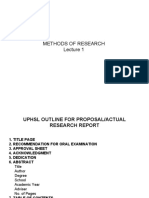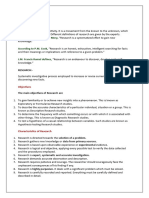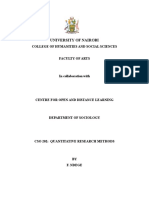0 ratings0% found this document useful (0 votes)
3 viewsRM 2
RM 2
Uploaded by
Rahul KumarRM
Copyright:
© All Rights Reserved
Available Formats
Download as PDF, TXT or read online from Scribd
RM 2
RM 2
Uploaded by
Rahul Kumar0 ratings0% found this document useful (0 votes)
3 views15 pagesRM
Original Title
rm-2
Copyright
© © All Rights Reserved
Available Formats
PDF, TXT or read online from Scribd
Share this document
Did you find this document useful?
Is this content inappropriate?
RM
Copyright:
© All Rights Reserved
Available Formats
Download as PDF, TXT or read online from Scribd
Download as pdf or txt
0 ratings0% found this document useful (0 votes)
3 views15 pagesRM 2
RM 2
Uploaded by
Rahul KumarRM
Copyright:
© All Rights Reserved
Available Formats
Download as PDF, TXT or read online from Scribd
Download as pdf or txt
You are on page 1of 15
Why P-3:?
A course in Research Methodology
Source: Singh (2006), Kothari (1985) and Dawson (2002)
The RESEARCH PROPOSAL OR SYNOPSIS
A research proposal is required by many universities and
institutions, and it serves as a useful basis for the evaluation of a
project as well as a guide line for the researcher.
The proposal contains a clear and concise statement of the
problem, the hypothesis involved, a recognition of the
significance of the problem, definitions of the important terms,
assumptions and limitations, an account of related literature, an
analysis of proposed research work, and a time schedule.
The proposal or synopsis is placed before the research degree
committee to examine its worth.
The final approval is given by this committee at university level.
It is like a blue print of research project.
The preparation of a research proposal or synopsis is an
important step in the research process.
The components of a research proposal
A worthwhile research work is likely to result only from a
well-prepared and well-designed proposal or synopsis.
A research proposal includes the following essential
parts:
1.The problem and statement of the problem.
2.The review of literature or theoretical framework of the
study.
3.The hypotheses and objectives.
4.The methodology and procedure of the study
5.Educational implications or significance of the problem
6.Definitions, assumptions and delimitations.
7.A tentative structure of the work/thesis/project.
8.Bibliography.
Research Methodology
.
‘Re-’ means again and again and ‘Search’ means to find out something,
the following is the process:
Therefore, research means to observe the phenomena again and again
from different dimensions.
For example there are many theories of learning due to the observation
from different dimensions.
The research is a process in which a person observes the phenomena
again and again and collects the data and on the basis of data s/he
draws some conclusions.
Rusk, Mouly, Cornell, Woody, Crawford, Cook, Monroe, Rummel and
many others have tried their ways to define Research Methodology.
However, one of the most convincing definitions is given by Redman
and Mory which reads as “Research is a systematized effort to gain new
knowledge.”
GENERAL CHARACTERISTICS OF RESEARCH
The following characteristics may be gathered from different definitions
of ‘Research’
1.It gathers new knowledge or data from primary or first-hand sources
2.It places emphasis upon the discovery of general principles.
3.It is an exact systematic and accurate investigation.
4.It uses certain valid data gathering devices.
5.It is logical and objective.
6.The researcher resists the temptation to seek only the data that
support his/her hypotheses.
7.The researcher eliminates personal feelings and preferences.
8.It endeavors to organize data in quantitative terms.
9.Research is a full of patience and unhurried activity.
10.The researcher is willing to follow his/her procedures to the
conclusions that may be unpopular and bring social disapproval.
11.Research is a carefully recorded and reported thing.
12.Conclusions and generalizations are drawn very carefully and
cautiously.
SPECIFIC CHARACTERISTICS OF RESEARCH
1. A sound philosophy of social studies as the basis of research
2. Research is based on insight and imagination:
3. Research requires an inter-disciplinary approach
4. Research usually employs deductive reasoning process
5. Research should come out of a desire to do things better
6. Research in social sciences is not as exactly the same to that of
physical sciences
7. Research is not the field of specialists only
8. Research generally requires inexpensive material
9. Research is based on the subjectivity and intangibility of social
phenomena
10. Research is perhaps incapable of being dealt through empirical
method
11. Research is based on inter dependence of causes and effect
12. Research cannot be a mechanical process
OBJECTIVES OF RESEARCH
The research includes the following three objectives:
1. Theoretical Objective: Those researches whose objectives are
theoretical, they formulate new theories, principles or laws.
Such type of research is explanatory because it explains the
relationships of certain variables.
These researches contribute some basic knowledge to the human
knowledge.
The researches in different disciplines i.e. Physics, Chemistry,
Mathematics etc. have the theoretical objective.
• The term scientific or even science may be thought of as an
approach to the gathering of knowledge rather than as a field or
subject matter.
• Science, to put it in simplest way, consists of two primary
functions: (1) the development of theory and (2) the testing of
substantive hypotheses that are deduced from theory.
• The scientist, therefore, is engaged in the use, modification, and
proposing or creating a theory.
• The scientist may emphasize an empirical approach in which data
collection is the primary method.
• It is a rational approach in which logical and deductive reasoning is
primary, or a combination of these approaches which is most
common in its execution.
• Regardless of the emphasis, the scientist begins with a set of ideas
that direct the effort that entails the development or testing of a
theory.
• By attempting to apply the rigorous, systematic observation and
the analysis used in the physical and biological sciences, the
research in social sciences/behavior have grown to a some
immeasurable height.
• Due to this height, the fields of anthropology, economics,
education, political science, psychology, and social psychology
and linguistics have all been recognized as sciences by many
authorities.
• One of the reasons for this acceptability is that these fields
are founded/grounded on scientific methodology.
• Some reject this concept, and they still define science in
terms of subject matter rather than methodology.
• Historically their position can be readily explained, because
scientific methods were first used in the investigation of
physical phenomena.
• Only within the last century it has happened so that the
methodology of science has been applied to the study of
various areas of human behavior.
• Because these are newer areas of investigation, their results
have not achieved the acceptance and status that come with
the greater maturity and longer tradition of the physical
sciences.
• The uniformity of nature is a reasonable assumption in the world
of physical objects and their characteristics, but in the area of
social behavior such assumptions are not warranted.
• Human nature is much more complex than many of its discrete
elements, even if they could be isolated and identified.
• Because human nature is so complex, it is much more difficult to
develop sound theories of human behavior than to predict
occurrences in the physical world.
• Research on human subjects has numerous problems:
• 1. No two persons are alike in feelings, drives, or emotions. What
may be a reasonable prediction for one may be useless for
another.
• 2. Human behavior is influenced by the interaction of the
individual with every changing element in his or her environment.
• 3. It is very difficult for the researchers to take in account human
beings under investigation and observe their behavior in a uniform
way without fallacies of some kind.
2. Factual Objective : Those researches whose objective is factual, they
find out new facts. This objective is by nature descriptive.
These researches describe facts or events which happened previously.
Such type of research is done in social sciences.
3. Application Objective: The research having application objective does
not contribute a new knowledge in the edifice of human knowledge but
suggests new applications.
By application we mean improvement and modification in practice. For
example if anyone gives a new application of electricity then such type
of research has application objective.
CLASSIFICATION OF RESEARCH
In actual practice, research is conducted at different levels and for
different immediate purposes.
The level at which a person operates in the field depends on the
objectives s/he intends to accomplish.
Generally research has two levels:
1. Basic Level: Trevers has defined basic level as basic research and it is
designed to add an organized body of scientific knowledge and does not
necessarily produce results of immediate practical value.
2. Applied Level: Applied research is undertaken to solve an immediate
practical problem and the goal of adding to scientific knowledge is
secondary.
TYPES OF RESEARCH
There are three types of objectives of research: theoretical, factual and
application.
The first two types of objectives of research contribute new knowledge
in the form of new theory and facts in a particular field of study or
discipline.
The third objective does not contribute to knowledge but suggests new
application for practical problems.
Steps of Research
The research work is done by reflective thinking and not by traditional
thinking. The reflective thinking functions systematically. The steps of
research are drawn from reflective thinking.
The following are the six steps of research:
1.Selection of the problem
2.Formulation of hypotheses
3.Design of research
4.Collection of data
5.Analysis of data
6.Formulation of conclusions
First Step : The problem is selected and defined. The feasibility of the
problem depends on its delimitations. Hence, the problem is also
delimited in this step.
Second Step: Some tentative solutions are given for the problem when
these solutions are based on certain rationale they are termed as
hypothesis. Therefore, in this step hypotheses are formulated.
Third Step : These hypotheses are subjected to verification. A design of
research is developed for collection of data or evidences for testing the
hypotheses. It involves method, sample and techniques of research. The
appropriate method and techniques are selected for this purpose.
Fourth Step: The observations and research tools are administered on
the subjects and their responses are scored out. Thus, the obtained data
are organized in tabulated form.
Fifth Step: The appropriate statistical techniques are used to analyze the
data so that some decisions may be taken about the hypotheses. The
results are used to draw some conclusions.
Sixth Step: The results are discussed and some conclusions are drawn in
the form of new information, theory, facts and solution for the practical
problems.
These steps are followed in all kinds of research. There might be some
fine adjustment of one or two steps or may be redefined in a bit
different way, but these steps are found in most of the research work in
one or other forms.
Characteristics of an Investigator
A good research worker should possess the following qualities:
1.He should have the full understanding about the functions and
activities of his job.
2.He should have the reflective thinking about various dimensions of his
job activities.
3.He should be sensitive towards his job. A sensitive person can
perceive the problem. Most of the teachers are problem blind because
they are not sensitive towards the job.
4.He should be creative and imaginative. These abilities are essential in
formulating the hypotheses for his problem.
5.He should have the knowledge and training of research.
6.He should have great insights in his area of research.
7.He should have the scientific attitude for studying and observing
things.
8.There should have an objectivity in his thinking.
9.His behavior should be democratic. The research design should not
intervene the activities of other researchers in similar area.
10.The most important characteristics is the patience and pursuant of
the investigator.
11.He should have knowledge and skill of measuring instruments and
elementary statistics.
12.He should have open mind so that he can discuss his problems with
his colleagues and experts of the field to have correct picture of the
problem.
13.He should have an urge to bring excellence in his job.
14.He should be economical in designing the project from time, energy
and money point of view.
Hypothesis:
We will talk about it in the next class
You might also like
- Discussion Forum Unit 3Document2 pagesDiscussion Forum Unit 3Safwan al ubaied0% (2)
- Eslp 025 Unit 09Document6 pagesEslp 025 Unit 09api-240356001No ratings yet
- Research Methods 400LDocument77 pagesResearch Methods 400Lsadiq rabiu umarNo ratings yet
- Research Skills First LectureDocument17 pagesResearch Skills First LectureAhmed GamalNo ratings yet
- MBA Research MtdsDocument241 pagesMBA Research MtdsBarzala CarcarNo ratings yet
- 4th Yeas-2022 - Research Methods Capter 1-4Document85 pages4th Yeas-2022 - Research Methods Capter 1-4Johanna TezeraNo ratings yet
- Science and Research-1Document18 pagesScience and Research-1Faisal MalikNo ratings yet
- 9376 All NotesDocument73 pages9376 All Notes03189981186snNo ratings yet
- Title Author Degree School Academic Year Adviser No. of PagesDocument11 pagesTitle Author Degree School Academic Year Adviser No. of PagesRealyn SolimanNo ratings yet
- 8604assignment01_copyDocument9 pages8604assignment01_copyHaseeba ShaheenNo ratings yet
- Fundamentals of ResearchDocument25 pagesFundamentals of ResearchPhilip Paranos100% (1)
- Chapter IDocument6 pagesChapter IAsaminow GirmaNo ratings yet
- What Is Research?: He Good ResearcherDocument12 pagesWhat Is Research?: He Good ResearcherGmailNo ratings yet
- Lecture One - PDF Original NewDocument8 pagesLecture One - PDF Original NewSoundous AchiNo ratings yet
- inbound244590250906252617Document12 pagesinbound244590250906252617Oca B. DexterNo ratings yet
- Module 1.Document4 pagesModule 1.Temie Bonhayag CarajayNo ratings yet
- Introduction To Research Course 2023 2024Document21 pagesIntroduction To Research Course 2023 2024eric2003ndayiNo ratings yet
- Methods of ResearchDocument193 pagesMethods of ResearchJudee Castillo100% (1)
- Fundamentals of Research (Assignment No. 1)Document9 pagesFundamentals of Research (Assignment No. 1)Paul DayangNo ratings yet
- Fundamentals of ResearchDocument9 pagesFundamentals of ResearchPaul DayangNo ratings yet
- Unit 1Document7 pagesUnit 1Taveri RajkhowaNo ratings yet
- PR1 All in HandoutDocument28 pagesPR1 All in HandoutJahsjshdjsjckdnekfjdbhsiskNo ratings yet
- Methods of Research (2 Semester, 2020-2021) Pedrito Jose V. Bermudo, Edd PHD ProfessorDocument154 pagesMethods of Research (2 Semester, 2020-2021) Pedrito Jose V. Bermudo, Edd PHD ProfessorYuriiNo ratings yet
- Research AssignmentDocument53 pagesResearch Assignmentsukhbir_k8375% (4)
- Course ContentsDocument13 pagesCourse ContentsAtik MahmudNo ratings yet
- Lect 1 Basis of ResearchDocument52 pagesLect 1 Basis of ResearchEllixerxes ChannelNo ratings yet
- Nature of Research and Social ResearchDocument10 pagesNature of Research and Social ResearchMever LosNo ratings yet
- RM 1Document17 pagesRM 1deepak malikNo ratings yet
- Classification of Law1Document7 pagesClassification of Law1Rajeev AnantaNo ratings yet
- Chapter 1Document25 pagesChapter 1Abene321No ratings yet
- Hawassa University Department of Adult Education & Community DevelopmentDocument130 pagesHawassa University Department of Adult Education & Community DevelopmentTeddyNo ratings yet
- Research Methodology - NotesDocument44 pagesResearch Methodology - Notesyamini umeshNo ratings yet
- Research Methodology L-2Document12 pagesResearch Methodology L-2PRITI DAS100% (1)
- Business REsearch MethodologyDocument74 pagesBusiness REsearch Methodologymanikadhakal772No ratings yet
- Research DesignDocument16 pagesResearch DesignRajaNo ratings yet
- Research Methods NotesDocument85 pagesResearch Methods NotesMumbere MuuminuNo ratings yet
- Research HandoutDocument95 pagesResearch HandoutgediongatzNo ratings yet
- R.M. NotesDocument37 pagesR.M. NotesAlex BerensonNo ratings yet
- RM Unit 1Document9 pagesRM Unit 1anubhaviawasthi20No ratings yet
- Assignment 302Document6 pagesAssignment 302Jboy Mnl0% (1)
- 1 Research Methodology1Document41 pages1 Research Methodology1Alazar TafeseNo ratings yet
- Assignment Fundamentals of Research Methodology: Dr. Khalid Mahmod BhattiDocument12 pagesAssignment Fundamentals of Research Methodology: Dr. Khalid Mahmod BhattiZohaib TariqNo ratings yet
- Pracrea1 Chapter 1Document36 pagesPracrea1 Chapter 1Abegail AcohonNo ratings yet
- Research PA 201 1st Tri 22Document59 pagesResearch PA 201 1st Tri 22mary claire candidoNo ratings yet
- Research ManualDocument57 pagesResearch ManualOliver ToquiroNo ratings yet
- Research Introduction GivnDocument4 pagesResearch Introduction GivnTrinayan DekaNo ratings yet
- What Is Psychological ResearchDocument3 pagesWhat Is Psychological Researchnupur guptaNo ratings yet
- Unit 1Document29 pagesUnit 1attisheyaNo ratings yet
- Advanced Composition and Initiation To Research - S4 - G3 - ZaidDocument31 pagesAdvanced Composition and Initiation To Research - S4 - G3 - ZaidKai KokoroNo ratings yet
- Introduction To Research MethodologyDocument8 pagesIntroduction To Research Methodologyzablonombiri001No ratings yet
- Chapter One Foundations of Research 1.1. Meaning and Nature of Social InquiryDocument37 pagesChapter One Foundations of Research 1.1. Meaning and Nature of Social InquiryMuluken AsfawNo ratings yet
- Book Review (Final)Document12 pagesBook Review (Final)Jun Rey ParreñoNo ratings yet
- SBT1002Document198 pagesSBT1002Kannan ThangaveluNo ratings yet
- Quantative Research Methods NotesDocument50 pagesQuantative Research Methods NotesNjeri MbuguaNo ratings yet
- Module 1-Nature of Inquiry & ResearchDocument11 pagesModule 1-Nature of Inquiry & ResearchAngela Cuevas DimaanoNo ratings yet
- Research Methodology - Unit - 1 - NotesDocument14 pagesResearch Methodology - Unit - 1 - Notessatya prakashNo ratings yet
- Introduction To ResearchDocument8 pagesIntroduction To ResearchApurv AswaleNo ratings yet
- ResearchDocument33 pagesResearchBeselamu BelilaNo ratings yet
- KLPK 3Document11 pagesKLPK 3Nur aisahNo ratings yet
- Introduction To Research MethodsDocument78 pagesIntroduction To Research MethodsMarutiNo ratings yet
- What Is ResearchDocument4 pagesWhat Is ResearchKashi BhuttaNo ratings yet
- Research Proposal a Simplified Step-by-Step Guide - Revised EditionFrom EverandResearch Proposal a Simplified Step-by-Step Guide - Revised EditionNo ratings yet
- Drum ImprovDocument3 pagesDrum Improvdl1485No ratings yet
- Action ResearchDocument20 pagesAction Researchdelarosajessica1995No ratings yet
- Assignment 1 Point 2 - Nqs PLP E-Newsletter No67Document3 pagesAssignment 1 Point 2 - Nqs PLP E-Newsletter No67api-250266116No ratings yet
- Chapter 3 Module The Therapeutic Nurse-Patient RelationshipDocument2 pagesChapter 3 Module The Therapeutic Nurse-Patient RelationshipJaylord VerazonNo ratings yet
- Master of Engineering (Civil & Structural) Study PlanDocument2 pagesMaster of Engineering (Civil & Structural) Study PlanJoel Koma Emesange100% (1)
- Disability Category ChartDocument4 pagesDisability Category Chartapi-325700981100% (1)
- Justification 2Document3 pagesJustification 2api-297284721No ratings yet
- Amity Business School: MBA, Semester - 3 Management of Software Projects Teena BaggaDocument55 pagesAmity Business School: MBA, Semester - 3 Management of Software Projects Teena BaggaAvi KoolNo ratings yet
- 30 Nursing Life Hacks You Probably Didn't Know About - Page 2 of 2 - NurseslabsDocument5 pages30 Nursing Life Hacks You Probably Didn't Know About - Page 2 of 2 - NurseslabsEricsonMitraNo ratings yet
- Assignment of School ManagementDocument3 pagesAssignment of School ManagementNashad aliNo ratings yet
- Ulama Deceased List in South AfricaDocument3 pagesUlama Deceased List in South AfricaFaizel Patel100% (1)
- Normality, Mental Health, Life Cycle TheoryDocument2 pagesNormality, Mental Health, Life Cycle TheoryKo HakuNo ratings yet
- Lesson Plan For INSET 2 (Phy. Sci.)Document4 pagesLesson Plan For INSET 2 (Phy. Sci.)Aileen gay PayunanNo ratings yet
- Konsep Maqasid ShariahDocument13 pagesKonsep Maqasid ShariahAhmad Nurmizan100% (1)
- Trizya Rawat: Education SkillsDocument1 pageTrizya Rawat: Education SkillsTrizyaNo ratings yet
- Four Foundations of MindfulnessDocument11 pagesFour Foundations of Mindfulness1collection100% (2)
- Approval SheetDocument8 pagesApproval Sheetburt cruzNo ratings yet
- Chapter 8 - Sociological Perspectives Chapter 8 - Sociological PerspectivesDocument8 pagesChapter 8 - Sociological Perspectives Chapter 8 - Sociological PerspectivesmustafaNo ratings yet
- Research Paper Final DraftDocument5 pagesResearch Paper Final Draftapi-372789547No ratings yet
- Research Methodology AssignmentDocument2 pagesResearch Methodology AssignmentShafqat UllahNo ratings yet
- Experiences of Students With Learning Disabilities in Higher Education: A Scoping ReviewDocument12 pagesExperiences of Students With Learning Disabilities in Higher Education: A Scoping ReviewAlexandra KatsikiNo ratings yet
- (Izet) The Elements of Syllabi and Their Description Are As FollowedDocument4 pages(Izet) The Elements of Syllabi and Their Description Are As FollowedEgie SuhendarNo ratings yet
- Math5 Jul8Document14 pagesMath5 Jul8RoderickNo ratings yet
- Automated Fare CollectionDocument34 pagesAutomated Fare CollectionSuhas S Sundar100% (1)
- 1253am23.mr. Megharaja.BDocument7 pages1253am23.mr. Megharaja.Brahulri2002No ratings yet
- Text 4 - Babies Prove Sound Learners - HandoutDocument4 pagesText 4 - Babies Prove Sound Learners - HandoutImane DahhaneNo ratings yet
- Multiple Choice Questions On FruitsDocument6 pagesMultiple Choice Questions On FruitsArindam BarmanNo ratings yet
- Time Series 10.1007@s10618 019 00619 1Document47 pagesTime Series 10.1007@s10618 019 00619 1Kent WellsNo ratings yet

























































































